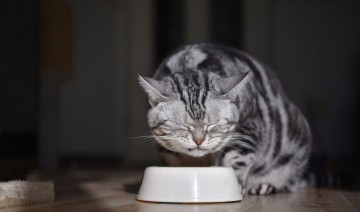
Many cats can be finicky eaters, but if your cat stops eating completely it is always a cause for concern. Knowing what to do when your cat won’t eat can help cat owners better understand their pet’s feeding habits and nutritional needs to ensure the cat always has a tasty, healthy diet to enjoy.
What Is Finicky Feeding Behavior?
Cats can demonstrate a wide range of finicky feeding behaviors that are perfectly normal. A cat might initially sniff at or refuse even a familiar food before deciding to eat some time later, or the cat might only nibble at food instead of consuming a full meal. A cat’s tastes might change, especially as the cat grows older and its senses shift, or it might beg for extra treats and special snacks. These are all normal behaviors, so long as the cat does eventually continue to eat. Completely skipping meals, especially multiple meals, is a sign of trouble, however, and should be noted and dealt with.
Why Your Cat Won’t Eat
It is not normal for a cat to completely refuse a meal, especially if it is familiar food the cat has previously accepted without trouble. If the cat won’t eat, it could be a sign of…
- Territoriality or Bullying – If there are multiple cats eating at once, a more submissive cat may feel intimidated and unable to eat if a dominant cat takes over or a new cat arrives.
- Dental or Mouth Problems – Broken or sore teeth or gums, as well as mouth, tongue, or lip injuries may make a cat reluctant to eat because of pain or discomfort.
- Food Spoilage – Cats have sensitive tastes, and if the food has begun to spoil or its taste is altered, the cat may refuse the meal.
- Food Changes – Some cats are naturally pickier than others, and may refuse new foods or changed food formulas that have unfamiliar tastes or textures.
- Recent Vaccinations – Loss of appetite is a common side effect of some feline vaccinations, and cats might skip a meal immediately after getting a vaccination.
- Change in Routine – Because cats prefer familiar routines, any change such as recent travel, a new feeding location, or home remodeling could cause anxiety that might affect a cat’s appetite.
- Illnesses – Different illnesses, especially those that affect the digestive tract, can change a cat’s appetite. Diabetes, pancreatitis, ulcers, and other problems could cause a cat to stop eating.
While missing a meal occasionally won’t cause too many problems for a cat, refusing to eat for a longer period can cause metabolic changes that may lead to rapid weight loss, kidney failure, liver damage, and other health concerns. It is important to recognize why a cat might stop eating, in order to quickly fix any problems affecting the cat’s appetite and encourage regular meals.
What to Do If Your Cat Stops Eating
There are many steps you can take when your cat won’t eat to make each meal more appetizing. If your cat doesn’t want to eat its meals, try…
- Offering the cat’s preferred foods, or mixing in a few special treats to the meal for a better taste so the cat is more eager to eat.
- Cleaning food bowls frequently and ensuring there is no old food or soap residue that could leave a foul taste.
- Restoring the regular feeding area if the cat’s bowls have recently been moved or rearranged, so the cat can return to its regular mealtime pattern.
- Feed other pets, especially multiple cats, out of sight of one another so there is no competition during mealtimes.
- Add more flavor to the cat’s regular food with a splash of anchovy or tuna juice, or a bit of low sodium chicken broth.
- Gently warm the cat’s food so the temperature and texture is more pleasing to the animal’s sensitive palate.
- Sprinkle the food with a small amount of grated parmesan cheese, which has a strong, salty flavor cats love.
- Offer a variety of foods to the cat to engage its senses and encourage broader tastes, which will help reduce picky eating.
- Take steps to alleviate other stresses and problems in the cat’s life, including health issues that could be affecting its eating.
If your cat refuses to eat more than two consecutive meals, if its feeding behavior changes abruptly, or if there are other signs of distress or discomfort, consult your veterinarian immediately for a proper diagnosis and treatment suggestions. While all cats may occasionally skip a meal, if a cat won’t eat entirely it is important to correct the problem right away, before additional health issues may develop. With care, however, you can stay alert to your cat’s feeding habits and encourage better mealtime manners to give your cat a healthy, nutritious diet it will be eager to eat with every meal.







Comments